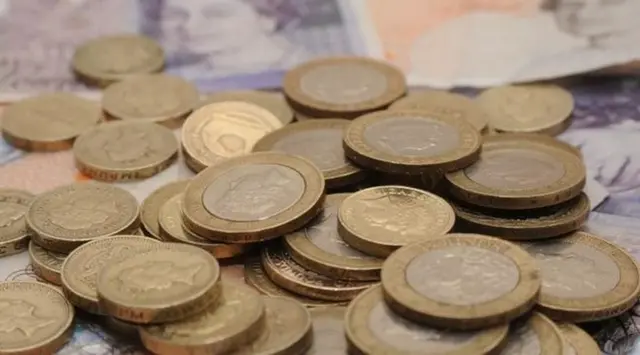Sterling has fallen to a three-year low against the euro after Theresa May outlined the timetable for starting Brexit negotiations.
It also hit its lowest level against the dollar since the beginning of July.
On Sunday, the prime minister said she would trigger Article 50, the clause needed to start the process, by the end of March 2017.
That means the UK is likely to leave the EU by mid-2019.
In early morning trade, the pound fell by about 1% against the euro to €1.1433, but it had recovered slightly by late evening.
However, the pound was still down almost 1% against the dollar. At one point it touched $1.2818, its lowest rate since 6 July when it hit $1.2797.
Volatility
Mrs May's announcement had "unsurprisingly, been bad news for the pound", said Connor Campbell, Spreadex financial analyst.
"Sterling has been spooked by May's promise to trigger the dreaded Article 50 by the end of March 2017."
However, the currency had been particularly unsettled by the prospect of the UK leaving the EU single market, he said.
Pound falls as Theresa May indicates Brexit date. Photo: poundsterlinglive.com
"The PM, in a move to appease the more rabid members of the Tory party but one that is set to cause revolt from the backbenchers, has signalled that curbing immigration is the top Brexit priority even if it comes into conflict with Britain remaining in the single market," Mr Campbell added.
"Combine all this volatility together and the pound has been left at its worst price since the start of July."
Sixteen-month high
While the pound fell, share prices rose. At one point, the FTSE 100 share index was trading at 6,996.43, its highest level for 16 months, before falling back slightly to close 1.2% higher at 6,983.52.
"As a result of Prime Minister May's announcement ... the pound has weakened significantly, which is actually seen as a good thing by the FTSE 100 as it's quite an export-heavy index," said Henry Croft, research analyst at Accendo Markets.
The FTSE fell sharply in the immediate aftermath of the referendum, but has subsequently recovered and is up nearly 10%, because listed international-facing firms have benefited from the fall in sterling.
After the pound fell sharply at first on Monday, it then recovered some ground after a closely watched survey of the manufacturing sector indicated it grew at the fastest pace for two years in September.
But in afternoon trading, it fell against the dollar again after a US survey showed that manufacturing there had also grown strongly.
(BBC)
 简体中文
简体中文

